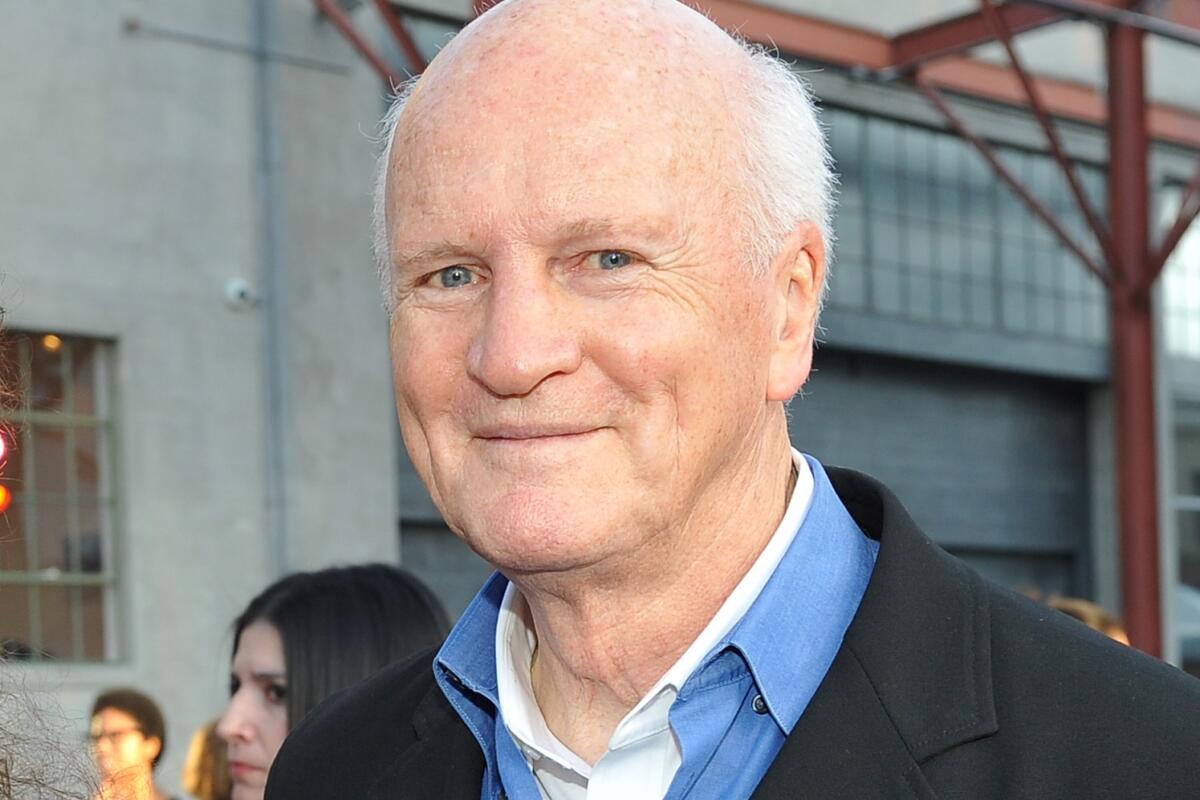He was a leading art dealer. Now, the 80-year-old could face more than a decade in prison

As prosecutors told it, Douglas Chrismas, once known as one of the nation’s leading dealers of contemporary art, was a man so consumed by greed and ego that he embezzled hundreds of thousands of dollars from his gallery’s bankruptcy estate to put toward the rent on a museum dedicated to himself.
Chrismas, founder of Ace Gallery, had “champagne wishes and caviar dreams,” Asst. U.S. Atty. Valerie Makarewicz told a jury in an embezzlement trial that began this week in federal court. Being responsible with money, she told the jury, “didn’t matter.”
But as his defense attorneys argued, Chrismas wanted to open that museum as a gift to Los Angeles and had used the money to pay its rent in an effort to ultimately help the bankruptcy estate.
Who the 80-year-old really is, and what his motivations were, would boil down to whose depiction the jury believed: that of the prosecution or the defense.
Megan Maitia, Chrismas’ attorney, likened the interpretation of the evidence to the famous duck-rabbit illusion, an ambiguous drawing in which either animal can be seen depending on the person looking. The same evidence the prosecution presents, Maitia said, “can mean the opposite.”
Bankruptcy problems at L.A.’s Ace Gallery. Catholics protest L.A. painter’s canvas in Virginia.
“In the end, the government is going to tell you and argue to you that they’ve proven all of the elements of embezzlement on a bankruptcy estate,” Maitia said. “With that same evidence we’re going to get up and argue and put on a case of a man who was desperate to save his business and it’s going to be up to you to decide which way you see it.”
On Friday, after less than an hour of deliberation, the jury offered their verdict on who had painted Chrismas best, finding him guilty of embezzling more than $260,000 from the bankruptcy estate of Ace Gallery while he acted as the estate’s trustee and custodian.
He faces a statutory maximum sentence of 15 years in federal prison.
It was the latest fall for the octogenarian who championed pioneering artists and sculptors such as Robert Irwin, Michael Heizer, Sol LeWitt, Bruce Nauman and Sam Francis, but who early on garnered a reputation for shady business dealings.
Chrismas, who opened his first gallery at 17, has lived and operated art galleries in L.A. since 1969.
Legal troubles and controversies have dogged him since, including a score of civil lawsuits alleging that Chrismas failed to pay artists for their work and had not delivered artworks bought and paid for by collectors. (Even Andy Warhol reportedly complained about missing payments from Chrismas).
In 1986, Chrismas pleaded no contest to a criminal charge that he stole seven contemporary artworks worth as much as $1.3 million. The stolen works included four pieces by Robert Rauschenberg and one each by Warhol, Frank Stella and Donald Judd.
Noted West Hollywood art dealer Douglas James Chrismas pleaded no contest Wednesday to a criminal charge that he stole seven contemporary artworks worth as much as $1.3 million.
Chrismas and his various companies have filed for bankruptcy protection several times.
In 2013, Chrismas filed for bankruptcy protection for the last time after not paying rent on Ace Gallery’s 30,000-square-foot flagship location on the second floor of the Wilshire Tower in the Miracle Mile district of L.A.
Between February 2013 and April 2016, when Ace was going through Chapter 11 proceedings, Chrismas remained the gallery’s president, trustee and custodian and oversaw all operations. This role also gave him access to the gallery’s property.
Chrismas remained in control of the gallery until April 2016, when the bankruptcy court appointed an independent trustee to run the bankruptcy estate and Chrismas was removed. Sam Leslie, a bankruptcy trustee and forensic accountant, took over management of the space and later filed a lengthy status report with the court documenting financial irregularities by Chrismas.
“The court left the defendant in charge of Ace Gallery because it and the creditors trusted him and expected him to run this business to benefit the people, the companies, the creditors of Ace Gallery,” Makarewicz told the jury. “But as the government will show you, [Chrismas] wasn’t open or honest with the creditors and the court.”
Douglas J. Chrismas, the founder of Ace Gallery on Miracle Mile, has been arrested on federal charges alleging he embezzled more than $260,000 from the gallery’s bankruptcy estate. A September trial date has been set.
Over the four-day trial, prosecutors told the jury that in late March and early April of 2016, Chrismas embezzled approximately $264,595 that belonged to the bankruptcy estate. That included a $50,000 check that Chrismas signed and that was paid to Ace Museum, a separate non-profit corporation that Chrismas owned and controlled.
They also presented evidence that Chrismas embezzled $100,000 owed to Ace Gallery by a third party for the purchase of artwork. Those funds also went to Ace Museum.
Finally, prosecutors said, Chrismas embezzled approximately $114,595 owed to the gallery by a third party that purchased artwork. That money was paid to Ace Museum’s landlord to keep current with its $225,000 monthly rent.
Jennifer Williams, one of Chrismas’ attorneys, told the jury that they didn’t dispute that the transactions went to Ace Museum, but said that Chrismas, “understood that to be estate property.”
“There’s no evidence, zero evidence that Mr. Chrismas as the owner of the gallery couldn’t make loans himself to other companies within his gallery universe,” Williams said.
By paying the rent, Williams added, Chrismas was also keeping a purchase option of the property “alive for the creditors.”
Makarewicz told the jury that Chrismas had had 11 years to exercise the purchase option and “it never happened.”
Ace Museum was intended to be Chrismas’ legacy, prosecutors said, “the culmination of his life’s work.”
“He wanted a legacy and he was willing to use other people’s money to buy that legacy,” Asst. U.S. Atty. David Williams said during trial. “You can’t chase your dreams with somebody else’s money. That’s called stealing.”
A sentencing hearing is scheduled for September 9.
Times staff writer Jessica Gelt contributed to this report.
More to Read
Sign up for Essential California
The most important California stories and recommendations in your inbox every morning.
You may occasionally receive promotional content from the Los Angeles Times.












